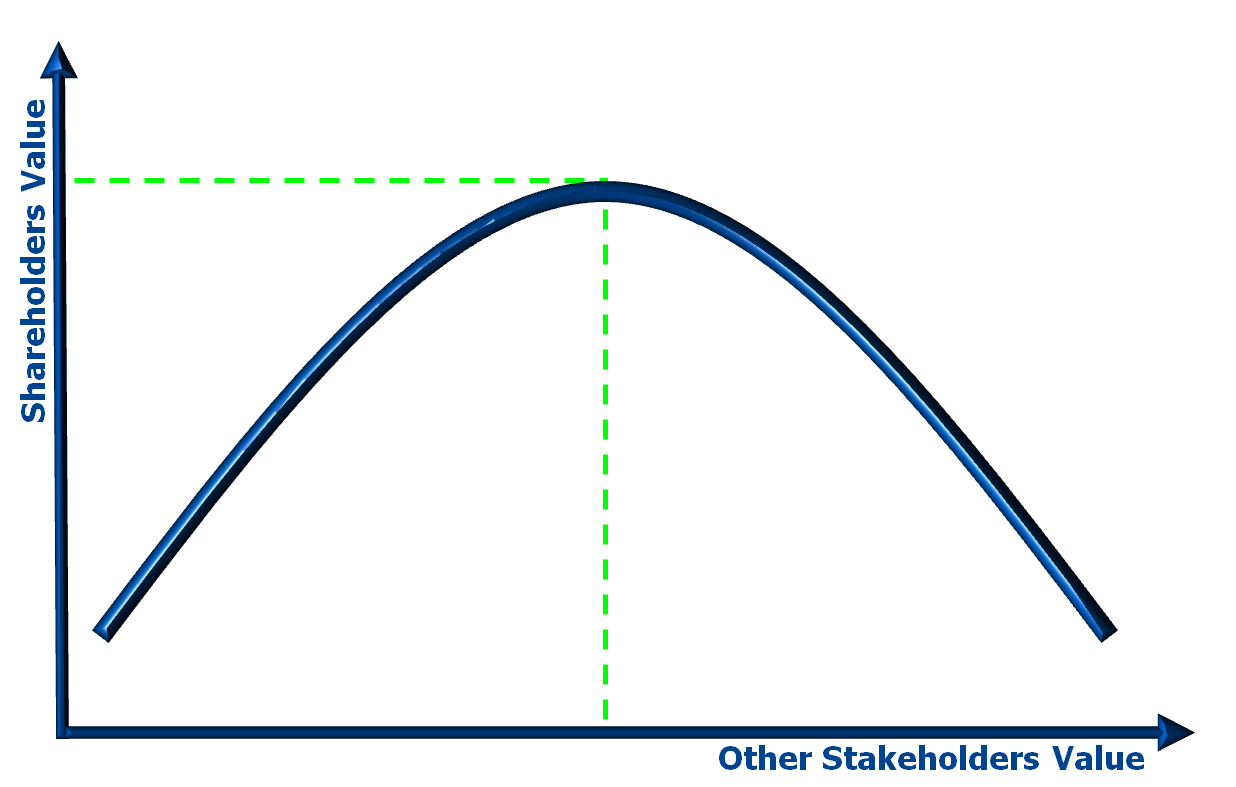

Today is
Have a Great Day !
Quick Links
|
RGB Global Philosophy |
Stakeholders Value Creation
First let’s answer the question “who are stakeholders”? Stakeholders, as the name suggests, are those who hold a stake in the fate of an organization. Stakeholders include employees, customers, suppliers, shareholders, and the community in general. Stakeholders, including shareholders, associate with an organization because they receive value from such association, because they share into a common belief.
The true value of a business is NOT ONLY the net present value of a Discounted Cash Flow, an ultimate measure for shareholders. Two businesses, with identical products, identical cash flows and identical balance sheet structures may deliver different value to shareholders, because they may have different risk profiles or satisfy non-financial value criteria differently:
- Political risk & Macro-economic risks
- Business execution risk & Management risks
- Good corporate citizenship and Social responsibility risks
- Environmental responsibility risks
There is no denying that Shareholders’ value creation is central to leadership effectiveness as it ensures independence and consequently, the continued existence of the organization, which in turns generates stakeholders value and thereby fulfills the expectations of customers and employees. But, conversely, shareholders value creation is inextricably linked to, or simply not sustainable, without the creation of value for other stakeholders of an organization.
In a rapidly globalizing, knowledge-based economy, sources of value creation in business are shifting from tangible assets such as land, equipment and discounted cash flows, to intangibles such as human and social capital. Research shows that the ability to understand and satisfy the expectations of multiple stakeholders, who have diverging and sometimes conflicting interests, is essential for developing and sustaining these critical intangible assets. Building better relations with primary stakeholders, like employees, customers, suppliers, and communities, leads to increased shareholder wealth by helping firms develop intangible, valuable assets, which become sources of competitive advantage.
Two crystallizable concepts further underline the importance of stakeholders value creation: i) the value generated by an organization is the sum of the value generated towards all its stakeholders, not only its shareholders; and ii) the responsibility of the leadership team, under the heighten scrutiny of corporate governance, extends to the proper governance of all risks aspects of the organization, which evidently extends to satisfying all stakeholders.
The Executive4sights™ framework does not displace the shareholders from the top of the pyramid, but simply advocates that the top of the pyramid is as solid as the base it sits on. This base is held together by other stakeholders; and organizations built for sustainable success thread a fine balance between the aspirations of shareholders and aspirations of other stakeholders.
The Executive4sights™ framework does not advocate either that all stakeholders are equal. Clearly customers and employees outweigh in importance suppliers and the community in general.
Stakeholders of an organization have many things in common, chief amongst which is a Fundamental belief. Employees will work for an organization, if they share its belief. Customer will buy from an organization when they share its belief. Investors will invest in the same organization because they share in its belief. The fundamental belief answers the question “why does this organization exist?”, and link all stakeholders in a common destiny.
 From this fundamental belief, the organization’s leadership has developed a strategic plan that is driven by its core strategies. The selection of the core strategies is where the stakeholders’ value creation is first articulated. Good strategies will aim at creating value for customers, shareholders, employees, suppliers and the community at large; they will always balance between growth and performance initiatives; they will create focus(1).
From this fundamental belief, the organization’s leadership has developed a strategic plan that is driven by its core strategies. The selection of the core strategies is where the stakeholders’ value creation is first articulated. Good strategies will aim at creating value for customers, shareholders, employees, suppliers and the community at large; they will always balance between growth and performance initiatives; they will create focus(1).
The creation of value for stakeholders should also be visible in the organization’s Core Values. Core values will guide employees in their day-to-day decisions, ensure they are able to prioritize their activities, and create a cohesive culture that will value the creation of value.
The chief role for an organization’s executive team is to maximize shareholders value while maximizing at the same time the value created for other stakeholders; and this is achieved by developing a coherent strategic plan encompassing value-creating core strategies; developing strategy execution abilities and ensuring organizational development.
|
© 2002-2010 - RGB Global Management Consulting
All rights reserved
Published at 20:01
11 March 2011

